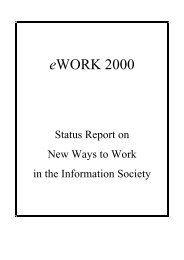Proceedings of 8th European Assembly on telework (Telework2001)
Proceedings of 8th European Assembly on telework (Telework2001)
Proceedings of 8th European Assembly on telework (Telework2001)
You also want an ePaper? Increase the reach of your titles
YUMPU automatically turns print PDFs into web optimized ePapers that Google loves.
114Telework - an opportunity for regi<strong>on</strong>al developmentEdvins Karnitis, Pr<str<strong>on</strong>g>of</str<strong>on</strong>g>essor, Assistant to the Minister <str<strong>on</strong>g>of</str<strong>on</strong>g> Ec<strong>on</strong>omy, LatviaAn integrated ec<strong>on</strong>omic, political and social strategy 1 for sustainable development <str<strong>on</strong>g>of</str<strong>on</strong>g> Latviaduring next 20-30 years has been elaborated in order to achieve the living standards <str<strong>on</strong>g>of</str<strong>on</strong>g> highlydeveloped countries. Co-ordinated activities are envisaged for unified development trends fornati<strong>on</strong>al ec<strong>on</strong>omy 2 , governance, educati<strong>on</strong> and other sectors that are significant for the State andsocial security, that make use <str<strong>on</strong>g>of</str<strong>on</strong>g> Latvia’s competitive advantages.Development <str<strong>on</strong>g>of</str<strong>on</strong>g> all regi<strong>on</strong>s as a multifuncti<strong>on</strong>al, diverse, balanced and sustained process, includingthe employment diversificati<strong>on</strong> adhering to the traditi<strong>on</strong>s and mentality is c<strong>on</strong>sidered a principalcomp<strong>on</strong>ent <str<strong>on</strong>g>of</str<strong>on</strong>g> the process.The regi<strong>on</strong>al development in strategic documents is defined as a process <str<strong>on</strong>g>of</str<strong>on</strong>g> positive ec<strong>on</strong>omic,social, envir<strong>on</strong>mental, cultural changes in the respective territory in order to promote the growth<str<strong>on</strong>g>of</str<strong>on</strong>g> general welfare level, security and living quality for the society. In Latvia there are noterritories without opportunities for development, but the regi<strong>on</strong>al development is not balancedand significant socio-ec<strong>on</strong>omic differences between regi<strong>on</strong>s exist – envir<strong>on</strong>mental and culturalnuances, differences in traditi<strong>on</strong>s, ec<strong>on</strong>omic activities, employment, income level 3 .Number <str<strong>on</strong>g>of</str<strong>on</strong>g> territories has been defined as extra supported areas according to specific criteria.Several rural territories have been the l<strong>on</strong>g-time lagging regi<strong>on</strong>s, the support policy shall be givenover to the respective regi<strong>on</strong> assistance. Functi<strong>on</strong>ing and development <str<strong>on</strong>g>of</str<strong>on</strong>g> the borderland is morecomplicated – special security status, outskirts effect and in the same time improved opportunitiesfor cross border cooperati<strong>on</strong>. Ec<strong>on</strong>omic development <str<strong>on</strong>g>of</str<strong>on</strong>g> protected areas should be coordinated withsystematical maintenance <str<strong>on</strong>g>of</str<strong>on</strong>g> the protected biotypes and territories.Hence territorial aspect and regi<strong>on</strong>al sectoral structural policy become an important comp<strong>on</strong>ent <str<strong>on</strong>g>of</str<strong>on</strong>g>the integrated state development strategy in order to establish advantageous and equal living andemployment c<strong>on</strong>diti<strong>on</strong>s in all Latvian regi<strong>on</strong>s and to reduce undesirable regi<strong>on</strong>al differences.Baselines <str<strong>on</strong>g>of</str<strong>on</strong>g> the regi<strong>on</strong>al strategy include diversificati<strong>on</strong> <str<strong>on</strong>g>of</str<strong>on</strong>g> ec<strong>on</strong>omy in the countryside, citieswill become crystallizati<strong>on</strong> centres for development <str<strong>on</strong>g>of</str<strong>on</strong>g> the new ec<strong>on</strong>omy in the province. Formati<strong>on</strong><str<strong>on</strong>g>of</str<strong>on</strong>g> the knowledge hubs (university/college, technological/business/industrial centre, informati<strong>on</strong>centre/library) will be stimulated in cities as <strong>on</strong>e <str<strong>on</strong>g>of</str<strong>on</strong>g> essential factors for development. But alsobusiness activities in the traditi<strong>on</strong>al branches (agriculture, as well as food, wood and light industry),that are modernized <strong>on</strong> advanced technological base, should be supported in all towns. At the sametime various forms <str<strong>on</strong>g>of</str<strong>on</strong>g> <strong>telework</strong> will become ordinary in the rural territories.1 http://www2.acadlib.lv/grey/valstsparvalde.htm2 Strategy for L<strong>on</strong>g-term Ec<strong>on</strong>omic Development (in Latvian). http://www.lem.gov.lv3 Macroec<strong>on</strong>omic Potrait <str<strong>on</strong>g>of</str<strong>on</strong>g> Latvia´s Regi<strong>on</strong>s. Central Statistical Bureau <str<strong>on</strong>g>of</str<strong>on</strong>g> Latvia. Riga, 2000.








